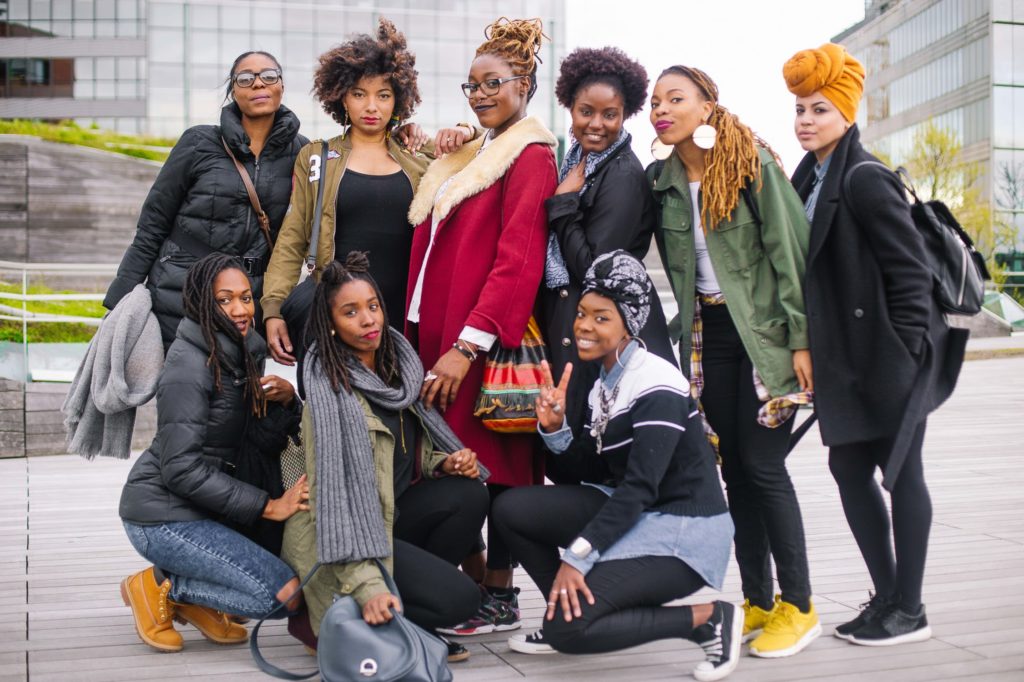A letter to the White Blues Dance Community
January 20, 2018
Dear community,
In the last day or two, Ellie made a post. It really set off a good conversation in the community. Surprisingly, I haven’t received that many messages yet. I’m slowly realizing that majority of my community has no idea of what it feels like to be a Black member of our dance scene. When I met Ellie in April, it was clear that she was upset about some things that I had recently become accustomed to. She was confused and hurt; I found myself being sympathetic and yet also less angry than I had expected. Some time passed after I met her, and I realized that I should visit her. Her post gave me the impression that her feelings at that event had only gotten worse, and I wanted to support the other Black member of my community. So I flew out to San Francisco to talk to my friend about the feelings one gets being Black in America and in the modern blues dance community. We spent all day talking about it, and honestly, most of my trip. The problem was, there was no end in sight; no way to explain to someone that’s it’s “just the way it is” without not feeling bad.
Ellie published her post in the last day or two. The reactions I’ve been seeing from my community is slightly distressing. Ellie called for anyone who was white to stop blues dancing. In her opinion, there is no way to dance that is not appropriative. On one hand, I have feelings about Ellie’s suggestion, but what I noticed was a great lack of understanding on how to respond to this post in a way that doesn’t make Black people uncomfortable. To me, it feels like you missed the point if you respond in any of these ways:
“We should focus on bringing more Black people to the community”
“I’m having feelings but I’m listening”
“Well it’s being used for my educational purposes”
“It’s a great way to study Black Culture”
“Well there are no Black people in the stands that care so what now”
“My one Black friend isn’t bothered by this so I don’t know why the rest of them are”
“It was my spiritual awakening”
“Let them in for free”
I could go through these one-by-one and explain my discomfort, but this is not the time.This is supposed to be a time to focus on the feelings of someone unlike yourself. If they were allowed to listen to the private talks of the Black people in the Lindy and Blues communities, I think many members of our community would be shocked at how isolated, unwanted, disrespected, and fed up we feel with the ways that we’re being treated. Our dances and heritage are being used by another culture purely for fun, in a way that doesn’t include us. There are inherent cultural values within the dance community that aren’t made for Black people. This is more common in the Lindy Hop Community but is still a thing in Blues. The socioeconomic differences also play a part in the ability for Black people and persons of colors to attend events.
Although I will always accept free entry into events, I don’t actually think it will fix the problems that we have in our community. Our problems are cultural, deep. We’ve decided what is important to us as a group, and sadly, that doesn’t usually include the things that are important to Black members of the community. There is a disparity in numbers. Our voices cannot drown out hundreds of voices. We fear being labeled or forced to leave because of of different values. This means that we end up feeling unheard and isolated in a way the other white members of the community don’t. The voices of women and the non-binary people in our community are lifted up, and yet the Black members of the community still go unheard. That frustration causes us to leave the community no matter how much we love it; no matter how much we love dance.
And so, in solidarity, we’ve created our own spaces and our own Facebook groups, we visit each other and we set aside time to get brunch with each other. All to acknowledge our own Humanity in a culture that refuses to do so. Acknowledging people who are different from you, and allowing that difference to change you is unheard of in our community. So, alone we cackle with each other and praise each other. For once, we enjoy the experience of not being “the only one”. For once, we don’t have to change. For once, being able to solo jam with a person who truly gets it…
Although I understand where Ellie is coming from, and I’ve had some of the same feelings, I believe her solution to the issue is unsustainable. I understand that that’s her point, but I find myself deeply hurt by the possible disappearance of something so dear to me. White folk aside, getting in touch with Blues, getting in touch with Lindy Hop, and now doing Obsidian has made me feel so connected to being Black. My family life is filled with troubles, and I probably won’t be having children, so this for me is my Heritage and Legacy. That’s all I have. Perhaps this is The Optimist in me, but I would rather challenge the community to get better than see them quit.
To quit is to leave right when the work gets hard. A few months back, I asked a friend of mine to write a post because I needed him to. He used his voice in a way that pushed through all the noise of a community to the forefront. I asked him to write that because I wanted to know that he cared about me, our friendship, and my feelings more than he cared about his discomfort. He cared about me and my feeling like a human being in our space more than he cared about hurting someone’s feelings. These last few months, I’ve heard from some of the upper-level dancers that they’re tired of the negativity. I’ve heard that they’re quitting, they’re moving to other scenes, and I always find myself disappointed. I find that people in this community are willing to say what they will do, but when action and effort are required to be better (to challenge themselves to care, to read, to go out and meet other people), they disappear. Perhaps this is my abandonment issues coming to the forefront, but I find that so much more disrespectful. If you say you care, I think you should put in the work. I think you should stay, and suffer, and be uncomfortable, and do the work. Because we do, everyday.
Honestly, it gets to me. Yes, there are large ways that one can contribute to making Black people in the community more comfortable. But there are also some really easy ways. If you know that Black women are asked to dance less often than any other population, go out of your way to ask them to dance. That’s not a difficult fix (there is a section on Obsidian exactly about this wink wink). If you’re not a vegetarian, have you been to a Black owned restaurant lately? Why is it, that as an American, I am supposed to know the words to business time, but white Americans don’t know to call Tyrone. How is that okay? It’s even bigger than the fact that we’re doing dances that came out of Black Culture, shouldn’t you care more? The only thing it does is deepen your understanding of something you say you’re passionate about. But also, you would think you would know more about that culture because you’re stepping into it. There’s a respectful and a disrespectful way to have any type of interest. Right now, most of the community isn’t really trying. Your Black friends see it. The Black people who enter your venues, hang out for 15 minutes and turn back around see it. The Black bands you hire look at you and come up to me later and mention “they don’t get it”. The POCs who aren’t even Black feel it. I keep hearing the question: “How do we get more Black people into our scene?” The answer is quite simple. Join our communities. Become our friends. Not because you feel some white guilt about how you participate in blues, but because you’re excited. Learn to code switch. Learn to adjust to other people’s cultures. If you’re talking to Black people more often, and they have not seen or done some of the things that you have, it’s probably just not a part of our culture. For instance, talking about the patriarchy, particularly with me, is just going to make me slightly confused. Our culture is matriarchal, that’s not to say that sexism isn’t present, but we use an entirely different system. We don’t relate to you on some of the things you think we do. That’s a thing that can easily encourage people to leave. You should never assume that a person who’s different from you is exactly like you or that they hold the same beliefs. It’s your job as an interested person to learn how to adjust that. Just like we have to.
Yes, clearly there is also bigger stuff to be done, but at least do the little things. At least try. I love this dance, this art form. It will it connect me to my past and to my future. But the amount of people that are hurt by watching people not care about them is horrible. And doing the dance without contexts, without knowledge, without Black people in your life, it’s just disrespectful on so many levels. One solution is the one that Ellie said: just stop doing it. I do believe that’s a solution and that her viewpoint is extremely valid. But for me, I ask you to reconsider the things that you do value, I ask you to educate yourself, and to really ask the people in your life what would make them feel better. Get to know them and know what would make them feel better. Stop allowing your friends, your instructors, your staff, to step all over us. Don’t you care about your friend’s feelings?
So let’s bring it back around. Ellie says you should quit blues dancing because you are appropriating. If you don’t decide to stop doing this dance, or lindy for that matter, put effort into not appropriating in the first place. Do you dance with non “famous” Black people? Invite them to dinners? Help with their hair and make-up? Can you avoid the priciest venues if you aren’t SHOUT and that’s your thing? Is your team diverse? Are your teachers? Do you have Black friends? Do you insist your friends do these things too? Join a community, reach out, do some anti-rascism work, stand up for us when we aren’t there. To be a diverse community, folks HAVE to be open to understanding people unlike themselves and encouraging them to be there. My hope is that this will get better so I feel like less of an outsider in a dance created by my own people. I’ve heard that our subculture strives to be better than the outside world. Don’t leave, do the work.

